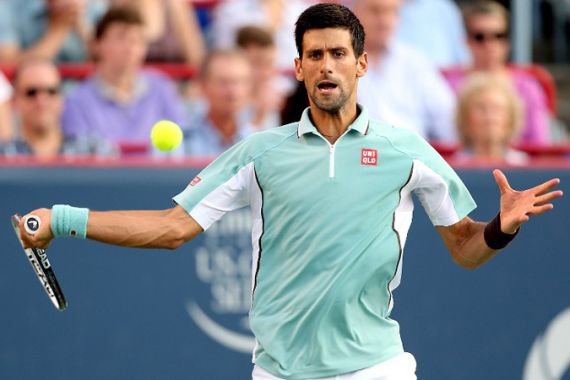Explainer: Why Novak Djokovic was not let into Australia
Top-ranked men’s tennis player had visa cancelled after arriving in Melbourne for the Australian Open.

Novak Djokovic came within one victory of sweeping all four of last year’s Grand Slam tennis tournaments and entered 2022 needing one title to set the men’s record of 21 major championships.
He might not get the chance to pursue that mark at the Australian Open when play begins in Melbourne on January 17.
Keep reading
list of 3 items‘Rules are rules’: Australia denies entry to Novak Djokovic
Novak Djokovic, tennis court warrior dividing opinion
That’s because, even though Djokovic, a 34-year-old from Serbia, was granted a medical exemption to get around a COVID-19 vaccine requirement for all players and their support teams at the hard-court tournament, his visa for entry into Australia was revoked in the early hours of Thursday after he was detained at the airport for about eight hours.
Here’s a look at some of the issues surrounding Djokovic’s attempt to play in the Australian Open:
Why was Djokovic granted a medical exemption? Was anyone else given one?
The Victoria State Government, where Melbourne Park is located, mandated full vaccinations for all players, staff and fans at the Australian Open unless there is a genuine medical reason.
Victoria state Deputy Premier James Merlino said medical exemptions would not be “a loophole for privileged tennis players” and would only be possible in “exceptional circumstances if you have an acute medical condition”.
Tennis Australia said Djokovic’s request for an exemption “was granted following a rigorous review process involving two separate independent panels of medical experts”.
Neither Tennis Australia nor Djokovic revealed the reason he sought an exemption.
Australian Open tournament director Craig Tiley said a total of 26 players or support staff applied for exemptions and a “handful” were granted.
I feel very uncomfortable with how Mr. Djokovic has been treated. No one deserves to be humiliated in this way. This could have been resolved before he travelled. Not a good image for #Australia to send to the world. https://t.co/EUkkJl2mrR
— Sophie McNeill (@Sophiemcneill) January 5, 2022
Why was he prevented from entering Australia then?
When he landed at the airport, the Australian Border Force cancelled Djokovic’s visa, saying he “failed to provide appropriate evidence to meet the entry requirements”.
“No one is above these rules,” Prime Minister Scott Morrison tweeted and later said at a news conference that Djokovic’s exemption was not valid but did not explain the details.
What has been the reaction in Serbia and Australia?
The news that Djokovic was on his way to Australia with an exemption was not exactly greeted warmly in Melbourne, where most people endured months of strict lockdowns and harsh travel restrictions at the height of the pandemic.
Following the announcement, former Australian rules football player Kevin Bartlett tweeted that Australians “have been taken for fools”.
Another former player, Corey McKernan, tweeted: “People with loved ones who are dying/some needing urgent treatment cannot get into their own states. You tell people they can’t go to Coles or a cafe without being vaxxed but if you’re world number one you get a pass?”
The about-face on Djokovic’s status upon his arrival was, not surprisingly, objected to by Serbian President Aleksandar Vucic, who called it “harassment”.
“The whole of Serbia is with him and … our authorities are undertaking all measures in order that maltreatment of the world’s best tennis player ends as soon as possible,” President Vucic said after speaking with Djokovic over the phone. “In line with all standards of international public law, Serbia will fight for Novak Djokovic, justice and truth.”
Djokovic’s father echoed that nationalistic tone, claiming his son had been “held captive for five hours” at Melbourne airport and should return home to a hero’s welcome.
“This is a fight for a libertarian world, this is not just a fight for Novak, but a fight for the whole world,” he told the Russian state-run Sputnik media outlet in Serbia.
Yesterday I tweeted this government takes credit for everything and responsibility for nothing. Since then the PM said the Djokovic visa issue was a matter for Victoria. Then he took credit when entry was denied. This is getting ridiculous.
— Barrie Cassidy (@barriecassidy) January 6, 2022
Is Djokovic vaccinated? Has he had COVID-19?
While Djokovic has refused to explicitly say whether or not he received any shots to protect against the coronavirus, he would not have needed an exemption to enter Australia if he were fully vaccinated.
Previously, he issued a statement saying: “Personally I am opposed to the vaccination against COVID-19 in order to be able to travel. But if it becomes compulsory, I will have to make a decision whether to do it, or not.”
Two months later, he and his wife tested positive for the illness caused by the coronavirus after a series of exhibition matches he organised with no social distancing or masking.
What happens next?
Djokovic fought against deportation from Australia and is currently being held at the Park Hotel, used as a quarantine and immigration detention facility in Melbourne.
Court officials said Judge Anthony Kelly would hear Djokovic’s appeal against imminent deportation which has been pushed back to 07:00 GMT.